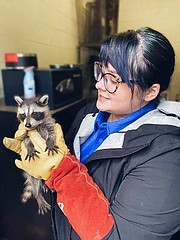
It’s the time of year when Alexandria’s wildlife comes to life – foraging, building nests and raising their young. For the animal welfare officer of the Animal Welfare League of Alexandria (AWLA) and wildlife specialist Megan Lawrence, this means action-packed days. A recent call was about a common problem with wildlife: squirrels.
“A tree had been felled in Del Ray and there was a squirrel nest with three babies in the trunk,” recalled Lawrence. First, Lawrence and colleague Sgt. Megan Boyd removed the week and a half old babies from the tree trunk that was now on the ground. The babies hadn’t yet opened their eyes or developed their fluffy tails, recalls Lawrence. “They only had a thin layer of gray fur – and lots of fleas. We picked them up one by one, ”she said.
Lawrence and Boyd placed the babies in a modified shoebox padded with a synthetic squirrel nest – hand-knitted by AWLA volunteers – and nailed the box as high as they could to another tree. “But the babies started screaming, mom came running and then she looked at us.” She had already made a new plan: she took the babies out of the nest and transported them to a new one in another tree.
Wildlife, says Lawrence, is very resourceful and adaptable. “We examine them carefully before removing ourselves injured animals to rehabilitate them, as it is best not to deal with an animal that has a chance in the wild,” she said. Since the officers were able to reconnect the baby squirrels to their mother in this case, the optimal result was achieved.
In addition to squirrels, Alexandria has a rich population of all kinds of wildlife: birds, raccoons, possums, rabbits, marmots, foxes, deer, and more. Lawrence saw them all starting when he was 12 years old as a wildlife rehabilitator in Maryland, including two as licensed master rehabilitators. Lawrence grew up with wildlife in a family that routinely rehabilitated injured and diseased wildlife on their bucolic property in St. Mary’s County, Md..
Lawrence, who spent time in nursing school and also has a degree in criminal justice, decided that the job as the AWLA Animal Services Officer was a mix of everything she was looking for in an environment that emphasized compassion towards animals and people. Working with AWLA staff, she learned how to handle pets such as dogs, a linchpin of skills that were honed with raccoons and skunks.
Lawrence said that sick and injured animals are assessed first, including consulting veterinarians and wildlife rehabilitators to determine what is best for the animals. If necessary, the animals are then transported to everyone in a network of rehabbers who specialize in different game species. One recent success story was about baby possums found in their late mother’s pouch in a local backyard. Brought to a rehabilitation facility by the AWLA, they were eventually released back into the wild. “We’re doing everything we can,” she said. “We’re even handing animals to rehabilitators hours away if that means they may have a better chance of success.”
Lawrence says she works daily to resolve people’s misconceptions about wildlife. A common one is that raccoons that migrate during the day must be sick. In reality, she said, raccoons are very opportunistic and sometimes eat during the day, especially in urban settings, when they are more likely to find food during the day. Opossums will do the same.
Some people are also alerted if they see a baby deer standing alone who thinks the animal has been abandoned. More likely, says Lawrence, the mother hid the fawn in search of food. Mother deer also keep a distance from their young so that they do not pass their scent on to them, as that scent can attract predators.
“However, when a little deer stands in a garden crying loudly, that’s a big red flag,” said Lawrence. “That probably means that mom hasn’t been around for a while and that Kitz needs help.” Lawrence advises calling the AWLA in this situation, as they have been specially trained to watch and determine when help is needed.
Some people also think that wildlife is not that good at parenting, Lawrence said, but the reality is that most wildlife excel at this. Baby raccoons stay with their mother until they are fairly large, she says, and are generally given excellent care. Foxes are very devoted parents who raise their kits together. Spending the time rehabilitating both a gray fox and a red fox inspired Lawrence to appreciate the species – and even a tattoo. “Foxes are so smart and playful,” said Lawrence. “You are my favorite animal.”
More information
The Alexandria Animal Welfare League is a local 501 (c) (3) organization that operates the Vola Lawson Animal Shelter, Alexandria’s only open access shelter. In response to the global pandemic, the AWLA has set up a virtual adoption process and operates a pantry that supplies needy community members with pet food and supplies. The AWLA also provides assistance to Alexandrians with questions about wildlife and animals in the community. More information is available at https://alexandriaanimals.org/.
Help with wildlife
Wildlife is resilient and generally thrives without human support. However, if you see an animal that appears sick, injured, or in danger, don’t hesitate to contact the AWLA Animal Services team on the police emergency number at 703-746-4444.
